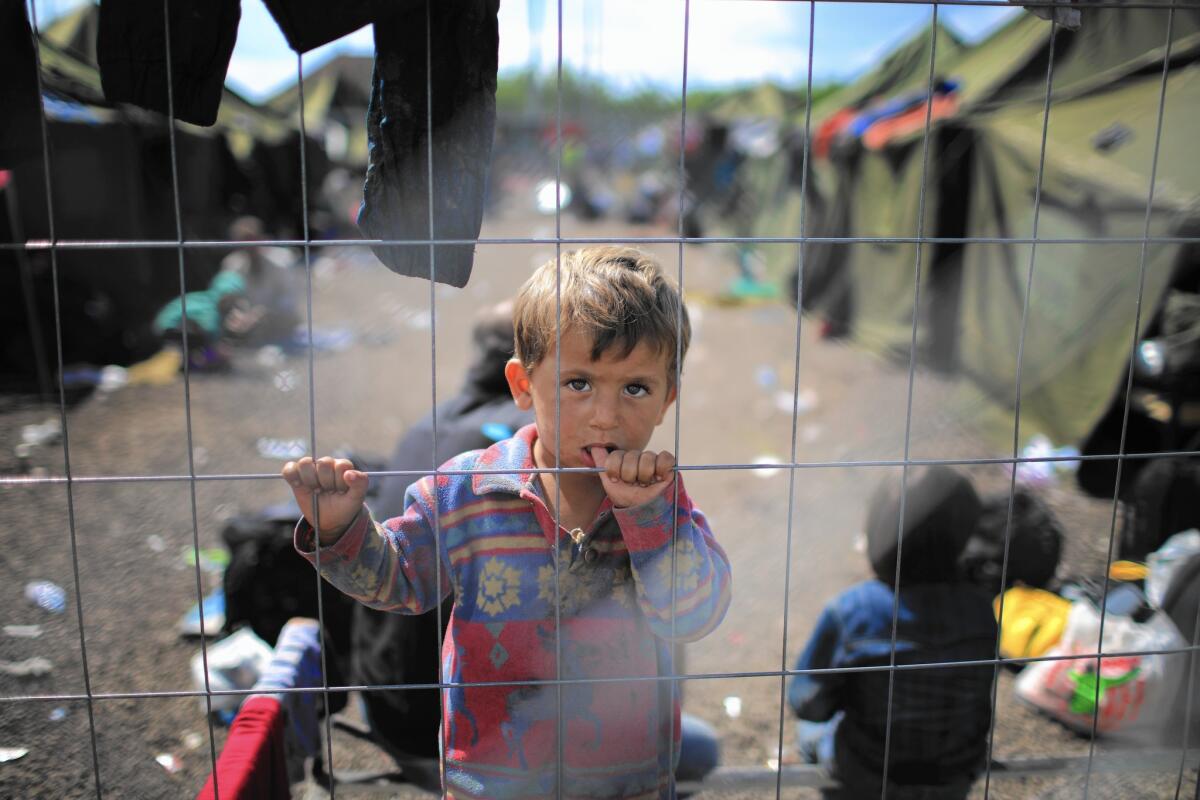Are terrorists posing as refugees to reach Europe? Probably not

A child looks out from a migrant holding camp at the Hungarian border with Serbia on Sept. 12, 2015.
- Share via
reporting from London — Fear that Islamist militants are lurking amid the massive influx of refugees flooding Europe have been debated in forums such as Facebook, think tanks and government circles.
But the risk of a rush of so-called refugee warriors appears overstated, in part because it is already easy for groups such as Islamic State to infiltrate Europe through safer, more conventional means, analysts say.
“I don’t see the need for ISIS to embark on such a convoluted scheme to carry out attacks or be a threat in the West,” said Reinoud Leenders, associate professor in international relations and Middle East studies at King’s College London’s Department of War Studies, referring to the militant group by an acronym.
Islamic State has “a huge reservoir of sympathizers who all have Western or European passports and who were born or raised there.”
Concern about security has been among the most potent arguments set forth by groups, from Britain to Hungary, that are seeking to limit the number of war-weary Middle Eastern refugees allowed to resettle.
Nigel Farage, leader of the anti-immigration UK Independence Party in Britain, contends that the European Union’s “interpretation of compassion actually could be a very real threat to our security.”
In an interview on London’s LBC radio, Farage said he sympathized with the viewpoint expressed in some Eastern European countries, notably by Hungary’s prime minister, that their strong Roman Catholic identity would be threatened by an influx of Muslims.
“My concern is that ISIS have actually said that they will use the migrant wave to flood Europe with half a million of their jihadist fighters.... Even if it’s only 500 I’m very worried about that.”
And on Facebook last week, a photo supposedly showing a “before and after” shot of a reputed militant posing as a refugee quickly was shared more than 80,000 times. As it turned out, however, the man, Laith Saleh, had been a commander in the Free Syrian Army fighting Islamist militants as well as forces loyal to Syrian President Bashar Assad.
The Facebook user who uploaded the photo apologized when reached by the BBC.
Such worry has been discussed in policy and academic circles since the 1994 Rwandan genocide, during which large numbers of Hutus entered neighboring Congo as refugees and then regrouped, recruiting among other refugees and launching attacks, Leenders said.
But there is little ground for such alarmist fear in the current humanitarian crisis, analysts say, partly because it would make little sense for a militant group to send trusted fighters on a perilous journey toward Europe that they might not survive.
“An overwhelming majority are genuine refugees,” Leenders said. “They are running away from violence, they do not engage in armed activities; that’s the very reason why they leave.”
Some analysts warn that suspicion and mistrust of the sea of refugees are being used for political ends.
“Rumors are very useful instruments in politics because they drive people towards certain ways of thinking,” said Nadim Shehadi, director of the Fares Center at Tufts University and associate fellow at the Chatham House think tank in London. “In Soviet times they used to block information. Now controlling information is impossible, but you can control the narrative.”
Amnesty International’s head of refugee and migrant rights contends that worry about the refugees adds “insult to injury.”
“You’re trying to flee for your life … but somehow you’re dangerous,” Sherif Elsayed-Ali said. “I think predominantly we should be thinking about how to help them rather than how not to take them.”
In Britain, Home Office figures released Thursday show that the number of people arrested on suspicion of terrorism-related crimes is at a record high, and that there has been a “marked increase” in the number of suspects who are British or dual nationals. But a solid majority of Britons appear to support Prime Minister David Cameron’s plan to resettle 20,000 more Syrian refugees by 2020.
In Germany, where Chancellor Angela Merkel has announced plans to accept as many as 800,000 asylum seekers, the head of the nation’s intelligence service has sought to assuage concern about security.
Gerhard Schindler told the Bild tabloid that there is “no concrete evidence” of terrorists coming to Germany posing as refugees from the Middle East or Africa.
He said it is much easier for terrorists to use “forged or stolen documents and a plane ticket” to enter than risk the treacherous journey across the Mediterranean.
Aid groups say that concern about the flow of refugees should speak to the need for safer, legal routes into Europe.
“To me it’s a flawed argument to say that we shouldn’t take people in because we’re scared of security issues,” said Gauri van Gulik, deputy director for Europe at Amnesty International. “Right now people are coming in and there are a lot of irregular crossings into Europe. This approach isn’t keeping people out.”
A managed flow, she said, would encourage an organized registration process and the ability to track those who enter the continent.
Boyle is a special correspondent.
More to Read
Sign up for Essential California
The most important California stories and recommendations in your inbox every morning.
You may occasionally receive promotional content from the Los Angeles Times.













